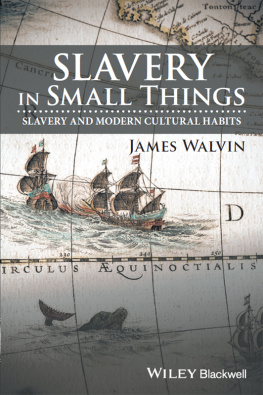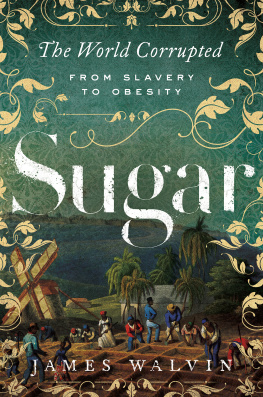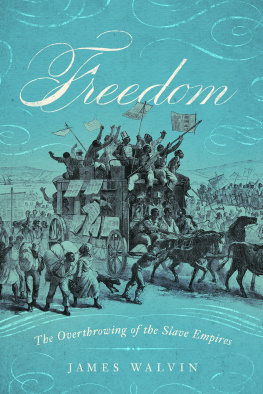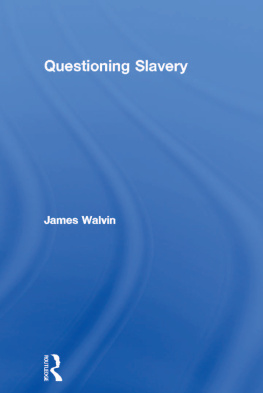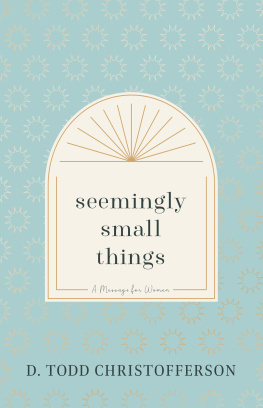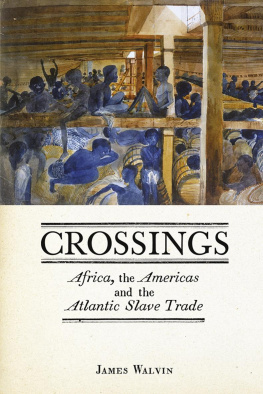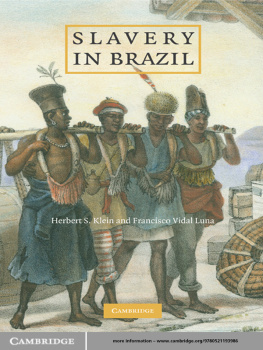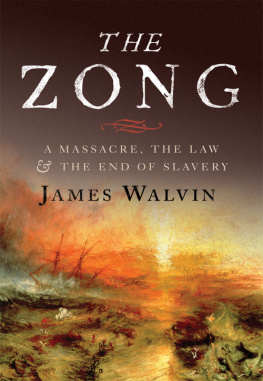Walvin - Slavery in Small Things
Here you can read online Walvin - Slavery in Small Things full text of the book (entire story) in english for free. Download pdf and epub, get meaning, cover and reviews about this ebook. year: 2017;2016, publisher: John Wiley & Sons, Incorporated, genre: Politics. Description of the work, (preface) as well as reviews are available. Best literature library LitArk.com created for fans of good reading and offers a wide selection of genres:
Romance novel
Science fiction
Adventure
Detective
Science
History
Home and family
Prose
Art
Politics
Computer
Non-fiction
Religion
Business
Children
Humor
Choose a favorite category and find really read worthwhile books. Enjoy immersion in the world of imagination, feel the emotions of the characters or learn something new for yourself, make an fascinating discovery.
Slavery in Small Things: summary, description and annotation
We offer to read an annotation, description, summary or preface (depends on what the author of the book "Slavery in Small Things" wrote himself). If you haven't found the necessary information about the book — write in the comments, we will try to find it.
Walvin: author's other books
Who wrote Slavery in Small Things? Find out the surname, the name of the author of the book and a list of all author's works by series.
Slavery in Small Things — read online for free the complete book (whole text) full work
Below is the text of the book, divided by pages. System saving the place of the last page read, allows you to conveniently read the book "Slavery in Small Things" online for free, without having to search again every time where you left off. Put a bookmark, and you can go to the page where you finished reading at any time.
Font size:
Interval:
Bookmark:

This edition first published 2017
2017 John Wiley & Sons, Inc.
Registered Office
John Wiley & Sons, Ltd, The Atrium, Southern Gate, Chichester, West Sussex, PO19 8SQ, UK
Editorial Offices
350 Main Street, Malden, MA 02148-5020, USA
9600 Garsington Road, Oxford, OX4 2DQ, UK
The Atrium, Southern Gate, Chichester, West Sussex, PO19 8SQ, UK
For details of our global editorial offices, for customer services, and for information about how to apply for permission to reuse the copyright material in this book please see our website at www.wiley.com/wiley-blackwell.
The right of James Walvin to be identified as the author of this work has been asserted in accordance with the UK Copyright, Designs and Patents Act 1988.
All rights reserved. No part of this publication may be reproduced, stored in a retrieval system, or transmitted, in any form or by any means, electronic, mechanical, photocopying, recording or otherwise, except as permitted by the UK Copyright, Designs and Patents Act 1988, without the prior permission of the publisher.
Wiley also publishes its books in a variety of electronic formats. Some content that appears in print may not be available in electronic books.
Designations used by companies to distinguish their products are often claimed as trademarks. All brand names and product names used in this book are trade names, service marks, trademarks or registered trademarks of their respective owners. The publisher is not associated with any product or vendor mentioned in this book.
Limit of Liability/Disclaimer of Warranty: While the publisher and author have used their best efforts in preparing this book, they make no representations or warranties with respect to the accuracy or completeness of the contents of this book and specifically disclaim any implied warranties of merchantability or fitness for a particular purpose. It is sold on the understanding that the publisher is not engaged in rendering professional services and neither the publisher nor the author shall be liable for damages arising herefrom. If professional advice or other expert assistance is required, the services of a competent professional should be sought.
Library of Congress Cataloging-in-Publication Data applied for.
9781119166207 (hardback)
9781119166221 (paperback)
A catalogue record for this book is available from the British Library.
Cover image: Arne Thaysen/Gettyimages
The idea for this book germinated at two places in the USA. When I was researching the history of one particular painting (J.M.W. Turner's The Slave Ship) I encountered the astonishing riches housed in Boston's Museum of Fine Arts. At much the same time, I was working in the collections of the Colonial Williamsburg Foundation, Williamsburg, Virginia. The books, manuscripts, furnishings, tableware, and portraits housed in the Rockefeller Library and various locations around Williamsburg (and in storage) provide a lavish version of life in colonial America. The longer I worked in Williamsburg, however, on what became annual visits, the clearer it became that there was a back-story a context to many of the artifacts on display, but one which often goes unnoticed. So many of the material objects derived directly or indirectly from the efforts of African slaves, or provided an entre into the story of the lives of enslaved Africans in the Americas. Yet who thinks of slaves when looking at a beautiful 18th-century sugar bowl, or a piece of mahogany furniture?
This simple question applies not only to North America but is equally relevant (and perhaps even more so) in Britain itself. Galleries, museum, private collections, stately homes, and palaces all these and more boast of and display items which belong not merely to the story of wealth, style, and fashionable taste, but to the astonishing history of African slavery in the Atlantic world. The link between voguish taste and brutal slavery generally goes unnoticed. This simple point set me off in search of the background. What is the connection between African slavery in the Americas and the development of key features of Western taste and style from the 17th century onward? This book tries to offer an answer.
Like all my earlier books, what follows has been made possible by the help, co-operation and friendship of people on both sides of the Atlantic. At the Colonial Williamsburg Foundation James Horn proved a stout friend and supporter over many years. He and his colleagues, notably Inge Flester and more recently Ted Maris Wolfe, but above all the staff in the Rockefeller Library, have always made my visits fruitful and enjoyable.
I made an initial effort to explain my ideas at a Conference on Visualizing Slavery and British Culture in the 18th century at Yale University in November 2014. There, David Blight and his colleagues at the Gilder Lehrman Center provided their traditional warm welcome, and an invigorating forum for what I said. Richard Rabinowitz again showed that his friendship does not obstruct his critical and imaginative approach to the study of history. Over many years, my work in the USA has been made possible and worthwhile by the kindness of a number of friends: Tolly and Ann Taylor, and Marlene and Bill Davis in Williamsburg, Bill and Elizabeth Bernhardt in New York City, and Fred Croton and Selma Holo in Los Angeles. Caryl Phillips, always willing to listen and to lend invaluable support, seems untroubled by my tendency to talk as much about football as history. Through thick and thin, all these friends have listened more patiently than I have a right to expect. Above all others, and as on so many other occasions, Jenny Walvin has lived at close quarters with my current interests, and makes everything possible.
In Hull, John Oldfield and David Richardson, and Richard Huzzey in Liverpool have proved great supporters. Most important of all, Peter Coveney at Wiley accepted the initial proposal for this book, and was hugely influential in seeing it through, though he had moved on before it appeared. The anonymous reviewers he commissioned to read the draft manuscript provided invaluable help in making what follows an infinitely better book than the one they read initially. This book was also improved by the efforts of Fiona Screen, an exemplary copy editor.
For years, Katie Campbell and Michael Davenport have provided a welcoming home-from-home in London. This time, Michael did not live to see the book materialize. I would have given a copy to him, but now, alas, I can only dedicate it fondly to his memory, echoing his favorite phrase, as we topped up his whisky glass, Un tout, tout petit peu.
James Walvin
March 2016
Our understanding of slavery has been totally transformed in the past fifty years. Between 1960 and 1964 I studied history as a British undergraduate. Or rather I studied British political history. I still have all my undergraduate notes and essays, and looking through them, and thinking about what I was taught (and on the whole taught well), I am now struck by how curiously insular how British (English even) were the historical issues on offer. What has become my major historical preoccupation slavery was not even mentioned. In lectures, tutorials, seminars, and essays, I can recall no mention whatsoever about slavery not one. The book of documents used for a Special Subject on the American Revolution mentions slavery on a mere 19 of the 368 pages, and even then largely in passing. It was of course a very long time ago, and historical interests, trends fads even have changed substantially: some have simply come and mercifully gone. In large measure the curriculum we studied was a reflection of how our teachers perceived and presented the subject, and what they thought suitable for undergraduate study. At the time slavery was only one of many topics which effectively did not exist in British undergraduate studies but which, today, are in great demand. The absence of slavery, in common with other areas of history, was partly a reflection of prevailing knowledge (or lack of it) and the consequent paucity of appropriate literature. There were no obvious books or studies of British slavery that would have provided students with the necessary materials. Equally, the teaching staff were interested in other historical problems for their own research careers. Social history, for example had only begun to make its first transformative impact in Britain. It was hardly surprising, then, that slavery did not even register as a noise off-stage.
Next pageFont size:
Interval:
Bookmark:
Similar books «Slavery in Small Things»
Look at similar books to Slavery in Small Things. We have selected literature similar in name and meaning in the hope of providing readers with more options to find new, interesting, not yet read works.
Discussion, reviews of the book Slavery in Small Things and just readers' own opinions. Leave your comments, write what you think about the work, its meaning or the main characters. Specify what exactly you liked and what you didn't like, and why you think so.

